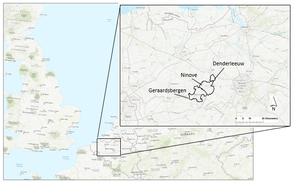LC 00005: verschil tussen versies
Geen bewerkingssamenvatting |
Geen bewerkingssamenvatting |
||
| (Een tussenliggende versie door dezelfde gebruiker niet weergegeven) | |||
| Regel 7: | Regel 7: | ||
''Number of inhabitants'': 38.692 inhabitants | ''Number of inhabitants'': 38.692 inhabitants | ||
''Relevant characteristics of the water system (main water bodies):'' the area lies 10 to 90 m above sea level and the main water body is the Dender river ( | ''Relevant characteristics of the water system (main water bodies):'' the area lies 10 to 90 m above sea level and the main water body is the Dender river (VMM, 2016). | ||
==== Flood risks ==== | ==== Flood risks ==== | ||
Flood risks in this area are riverine, and come from the Dender river. The risk probability is considered medium | Flood risks in this area are riverine, and come from the Dender river. The risk probability is considered medium | ||
* The Dender has naturally a quick hydrological response because the combination of a strong topography and the loam soils in the uphill zones ( | * The Dender has naturally a quick hydrological response because the combination of a strong topography and the loam soils in the uphill zones (VVM, 2016). In case of intense rainfall, the river response is relatively quickly, increasing its level. Furthermore, the Dender Basin has been subject to land sealing through urbanization enhancing this process. | ||
* The last flood of 2010 had a lot of impact and was identified as having a return period of 100 years. During these floods, an estimated 126 households were flooded ({{Cite|resource=Bestand:7 DENDER Inventarisatie overstromingen nov2010 LR.pdf|name=CIW, 2011|dialog=process-file-dialog}}). According to forecasts this could change into a 20 years return period by 2100 onwards. The total financial damage after the floods of 2010 was estimated at 180.000.000 EUR for the whole Dender catchment ({{Cite|resource=Bestand:PhD BarbaraTempels.pdf|name=Tempels, 2016|dialog=process-file-dialog}}). | * The last flood of 2010 had a lot of impact and was identified as having a return period of 100 years. During these floods, an estimated 126 households were flooded ({{Cite|resource=Bestand:7 DENDER Inventarisatie overstromingen nov2010 LR.pdf|name=CIW, 2011|dialog=process-file-dialog}}). According to forecasts this could change into a 20 years return period by 2100 onwards. The total financial damage after the floods of 2010 was estimated at 180.000.000 EUR for the whole Dender catchment ({{Cite|resource=Bestand:PhD BarbaraTempels.pdf|name=Tempels, 2016|dialog=process-file-dialog}}). | ||
* Impacts: If a 100 year-flooding occurs the potential number of households affected would be approximately 450 ({{Cite|resource=Bestand:PhD BarbaraTempels.pdf|name=Tempels, 2016|dialog=process-file-dialog}}). | * Impacts: If a 100 year-flooding occurs the potential number of households affected would be approximately 450 ({{Cite|resource=Bestand:PhD BarbaraTempels.pdf|name=Tempels, 2016|dialog=process-file-dialog}}). | ||
{{Light Context | {{Light Context | ||
|Supercontext=FR PLT PR 00010 | |Supercontext=FR PLT PR 00010 | ||
Huidige versie van 27 jun 2019 om 19:05
Ninove is located in the southeast area of the Province of East Flanders in Belgium. Within the city of Ninove, the pilot focuses on the area “Burchtdam” and the city-park neighbourhood in relation to the Dender river.
Figure 1: Map featuring the location of the FRAMES Belgian pilot areas, one of which is Ninove.
The size of the pilot area is: 72.57 km²
Number of inhabitants: 38.692 inhabitants
Relevant characteristics of the water system (main water bodies): the area lies 10 to 90 m above sea level and the main water body is the Dender river (VMM, 2016).
Flood risks
Flood risks in this area are riverine, and come from the Dender river. The risk probability is considered medium
- The Dender has naturally a quick hydrological response because the combination of a strong topography and the loam soils in the uphill zones (VVM, 2016). In case of intense rainfall, the river response is relatively quickly, increasing its level. Furthermore, the Dender Basin has been subject to land sealing through urbanization enhancing this process.
- The last flood of 2010 had a lot of impact and was identified as having a return period of 100 years. During these floods, an estimated 126 households were flooded (CIW, 2011). According to forecasts this could change into a 20 years return period by 2100 onwards. The total financial damage after the floods of 2010 was estimated at 180.000.000 EUR for the whole Dender catchment (Tempels, 2016).
- Impacts: If a 100 year-flooding occurs the potential number of households affected would be approximately 450 (Tempels, 2016).
Referenties
- Evaluatie inventarisatie overstromingen november 2010 Denderbekken. Integraal Waterbeleid. Bekken van de Dender. Hoofdstuk 2.3. Bekkenvoortgangsrapport 2010. Denderbekken, Anoniem, Commissie Integraal Waterbeleid, 1 januari 2011.
- Flood resilience: a co-evolutionary approach : residents, spatial developments and flood risk management in the Dender Basin, Tempels, B., Universiteit Gent, 1 januari 2016.

